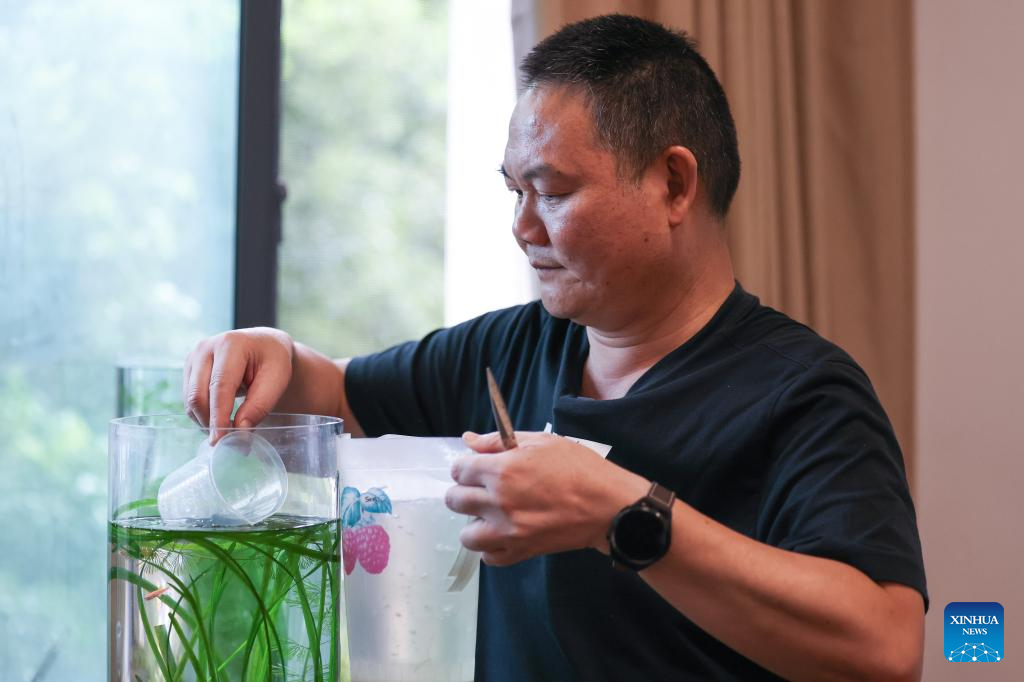
Xie Yonghong takes care of submerged plants at an office of the Institute of Subtropical Agriculture of the CAS in Changsha, central China's Hunan Province, July 8, 2023.
Xie Yonghong is the head of the Dongting Lake Station for Wetland Ecosystem Research under the Chinese Academy of Sciences (CAS). Researchers conduct studies on the ecosystem of the Dongting Lake wetland in this station, which was founded in 2009. Xie Yonghong has played an important role during the establishment of this station since its preparation phase in 2007.
Since 2009, Xie Yonghong and his team have taken root in the Dongting Lake wetland and committed to maintaining the local ecological balance and biodiversity for more than a decade. From the age of 36 to 50, Xie Yonghong has gradually become a scientific researcher focusing on scientific researches providing support for economic and social development and led other team members to withstand challenges and guard the Dongting Lake.
Dongting Lake, known as "the kidney of the Yangtze River," is the second-largest freshwater lake in China and one of the most important wetlands in China and the world. (Xinhua/Xue Yuge)

Members of the Dongting Lake Station for Wetland Ecosystem Research under the CAS prepare to collect plant samples in the east Dongting Lake nature reserve, central China's Hunan Province, July 9, 2023.
Xie Yonghong is the head of the Dongting Lake Station for Wetland Ecosystem Research under the Chinese Academy of Sciences (CAS). Researchers conduct studies on the ecosystem of the Dongting Lake wetland in this station, which was founded in 2009. Xie Yonghong has played an important role during the establishment of this station since its preparation phase in 2007.
Since 2009, Xie Yonghong and his team have taken root in the Dongting Lake wetland and committed to maintaining the local ecological balance and biodiversity for more than a decade. From the age of 36 to 50, Xie Yonghong has gradually become a scientific researcher focusing on scientific researches providing support for economic and social development and led other team members to withstand challenges and guard the Dongting Lake.
Dongting Lake, known as "the kidney of the Yangtze River," is the second-largest freshwater lake in China and one of the most important wetlands in China and the world. (Xinhua/Jin Liwang)

Doctor Zou Yeai, a member of the Dongting Lake Station for Wetland Ecosystem Research under the CAS, takes photos of the east Dongting Lake nature reserve in central China's Hunan Province, July 9, 2023.
Xie Yonghong is the head of the Dongting Lake Station for Wetland Ecosystem Research under the Chinese Academy of Sciences (CAS). Researchers conduct studies on the ecosystem of the Dongting Lake wetland in this station, which was founded in 2009. Xie Yonghong has played an important role during the establishment of this station since its preparation phase in 2007.
Since 2009, Xie Yonghong and his team have taken root in the Dongting Lake wetland and committed to maintaining the local ecological balance and biodiversity for more than a decade. From the age of 36 to 50, Xie Yonghong has gradually become a scientific researcher focusing on scientific researches providing support for economic and social development and led other team members to withstand challenges and guard the Dongting Lake.
Dongting Lake, known as "the kidney of the Yangtze River," is the second-largest freshwater lake in China and one of the most important wetlands in China and the world. (Xinhua/Jin Liwang)
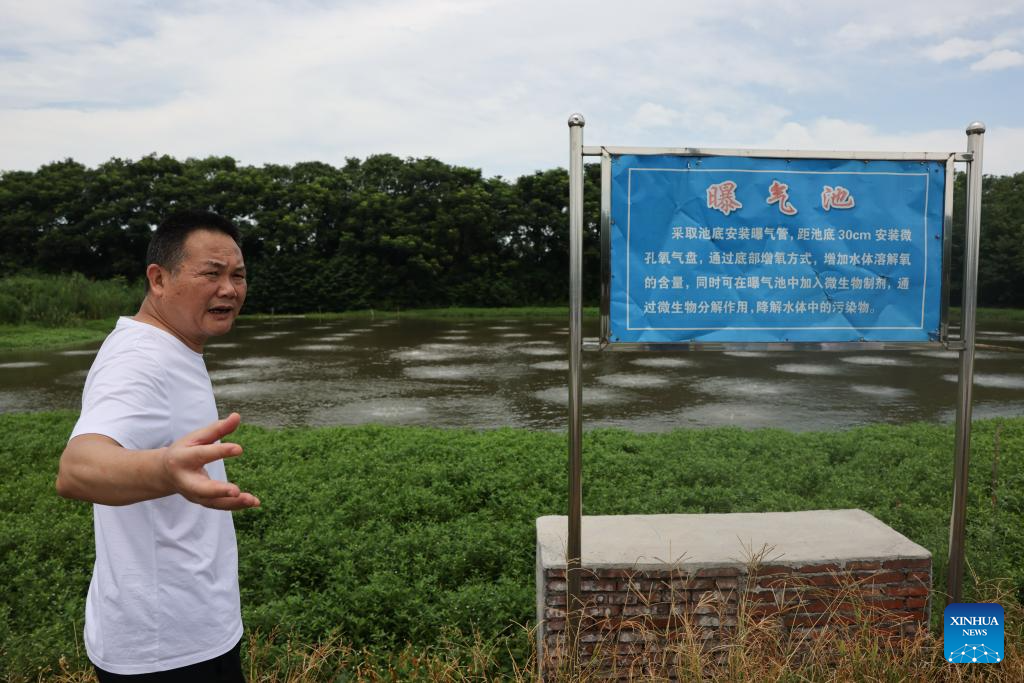
Xie Yonghong introduces a self-designed breeding tailwater treatment facility at a bullfrog breeding base in Heba Town, Datong Lake District of Yiyang, central China's Hunan Province, July 10, 2023. Located on the central region of the Dongting Lake, Datong Lake is known as "the heart of the Dongting Lake".
Xie Yonghong is the head of the Dongting Lake Station for Wetland Ecosystem Research under the Chinese Academy of Sciences (CAS). Researchers conduct studies on the ecosystem of the Dongting Lake wetland in this station, which was founded in 2009. Xie Yonghong has played an important role during the establishment of this station since its preparation phase in 2007.
Since 2009, Xie Yonghong and his team have taken root in the Dongting Lake wetland and committed to maintaining the local ecological balance and biodiversity for more than a decade. From the age of 36 to 50, Xie Yonghong has gradually become a scientific researcher focusing on scientific researches providing support for economic and social development and led other team members to withstand challenges and guard the Dongting Lake.
Dongting Lake, known as "the kidney of the Yangtze River," is the second-largest freshwater lake in China and one of the most important wetlands in China and the world. (Xinhua/Jin Liwang)

Researchers measure weight of sedge samples at the Dongting Lake Station for Wetland Ecosystem Research under the CAS in Yueyang, central China's Hunan Province, July 9, 2023.
Xie Yonghong is the head of the Dongting Lake Station for Wetland Ecosystem Research under the Chinese Academy of Sciences (CAS). Researchers conduct studies on the ecosystem of the Dongting Lake wetland in this station, which was founded in 2009. Xie Yonghong has played an important role during the establishment of this station since its preparation phase in 2007.
Since 2009, Xie Yonghong and his team have taken root in the Dongting Lake wetland and committed to maintaining the local ecological balance and biodiversity for more than a decade. From the age of 36 to 50, Xie Yonghong has gradually become a scientific researcher focusing on scientific researches providing support for economic and social development and led other team members to withstand challenges and guard the Dongting Lake.
Dongting Lake, known as "the kidney of the Yangtze River," is the second-largest freshwater lake in China and one of the most important wetlands in China and the world. (Xinhua/Xue Yuge)

This aerial photo taken on July 9, 2023 shows doctor Chao Chuanxin, a member of the Dongting Lake Station for Wetland Ecosystem Research under the CAS, checking the condition of submerged plants in the east Dongting Lake nature reserve, central China's Hunan Province.
Xie Yonghong is the head of the Dongting Lake Station for Wetland Ecosystem Research under the Chinese Academy of Sciences (CAS). Researchers conduct studies on the ecosystem of the Dongting Lake wetland in this station, which was founded in 2009. Xie Yonghong has played an important role during the establishment of this station since its preparation phase in 2007.
Since 2009, Xie Yonghong and his team have taken root in the Dongting Lake wetland and committed to maintaining the local ecological balance and biodiversity for more than a decade. From the age of 36 to 50, Xie Yonghong has gradually become a scientific researcher focusing on scientific researches providing support for economic and social development and led other team members to withstand challenges and guard the Dongting Lake.
Dongting Lake, known as "the kidney of the Yangtze River," is the second-largest freshwater lake in China and one of the most important wetlands in China and the world. (Xinhua/Xue Yuge)
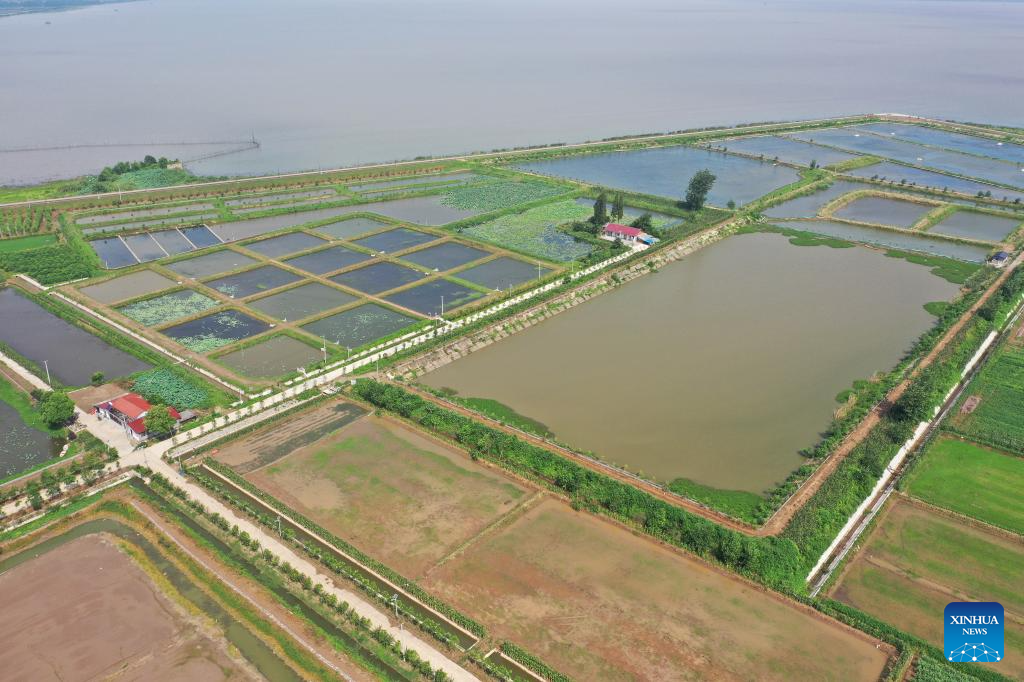
This aerial photo taken on July 10, 2023 shows a research base of the CAS for agricultural green transformation and development in Heba Town, Datong Lake District of Yiyang, central China's Hunan Province. Located on the central region of the Dongting Lake, Datong Lake is known as "the heart of the Dongting Lake".
Xie Yonghong is the head of the Dongting Lake Station for Wetland Ecosystem Research under the Chinese Academy of Sciences (CAS). Researchers conduct studies on the ecosystem of the Dongting Lake wetland in this station, which was founded in 2009. Xie Yonghong has played an important role during the establishment of this station since its preparation phase in 2007.
Since 2009, Xie Yonghong and his team have taken root in the Dongting Lake wetland and committed to maintaining the local ecological balance and biodiversity for more than a decade. From the age of 36 to 50, Xie Yonghong has gradually become a scientific researcher focusing on scientific researches providing support for economic and social development and led other team members to withstand challenges and guard the Dongting Lake.
Dongting Lake, known as "the kidney of the Yangtze River," is the second-largest freshwater lake in China and one of the most important wetlands in China and the world. (Xinhua/Xue Yuge)
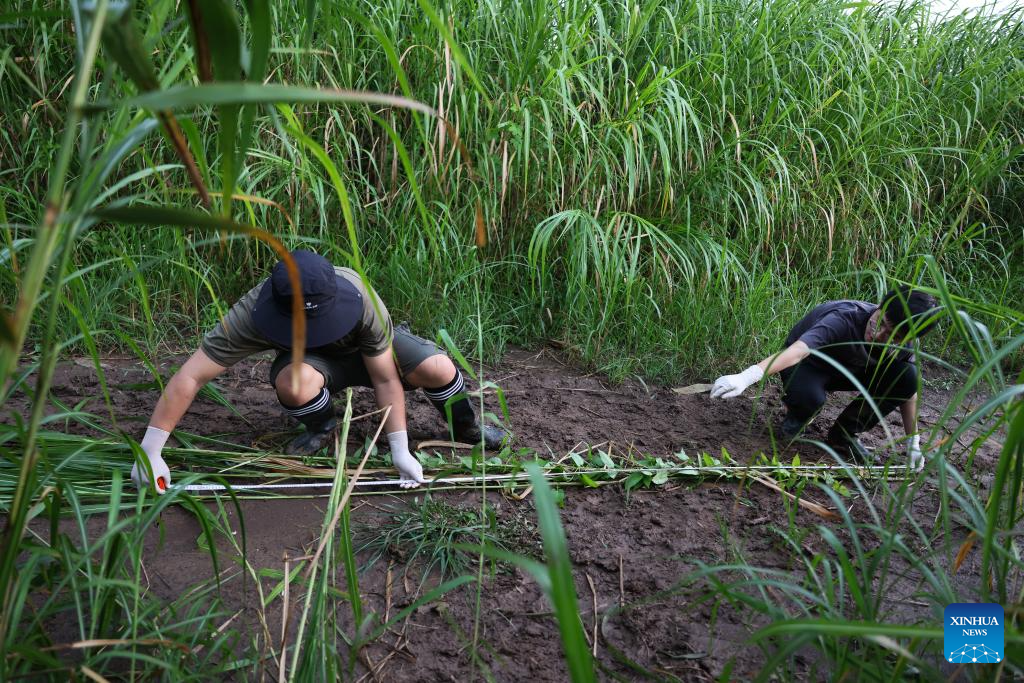
Members of the Dongting Lake Station for Wetland Ecosystem Research under the CAS measure the length of a plant sample in the east Dongting Lake nature reserve, central China's Hunan Province, July 9, 2023.
Xie Yonghong is the head of the Dongting Lake Station for Wetland Ecosystem Research under the Chinese Academy of Sciences (CAS). Researchers conduct studies on the ecosystem of the Dongting Lake wetland in this station, which was founded in 2009. Xie Yonghong has played an important role during the establishment of this station since its preparation phase in 2007.
Since 2009, Xie Yonghong and his team have taken root in the Dongting Lake wetland and committed to maintaining the local ecological balance and biodiversity for more than a decade. From the age of 36 to 50, Xie Yonghong has gradually become a scientific researcher focusing on scientific researches providing support for economic and social development and led other team members to withstand challenges and guard the Dongting Lake.
Dongting Lake, known as "the kidney of the Yangtze River," is the second-largest freshwater lake in China and one of the most important wetlands in China and the world. (Xinhua/Jin Liwang)
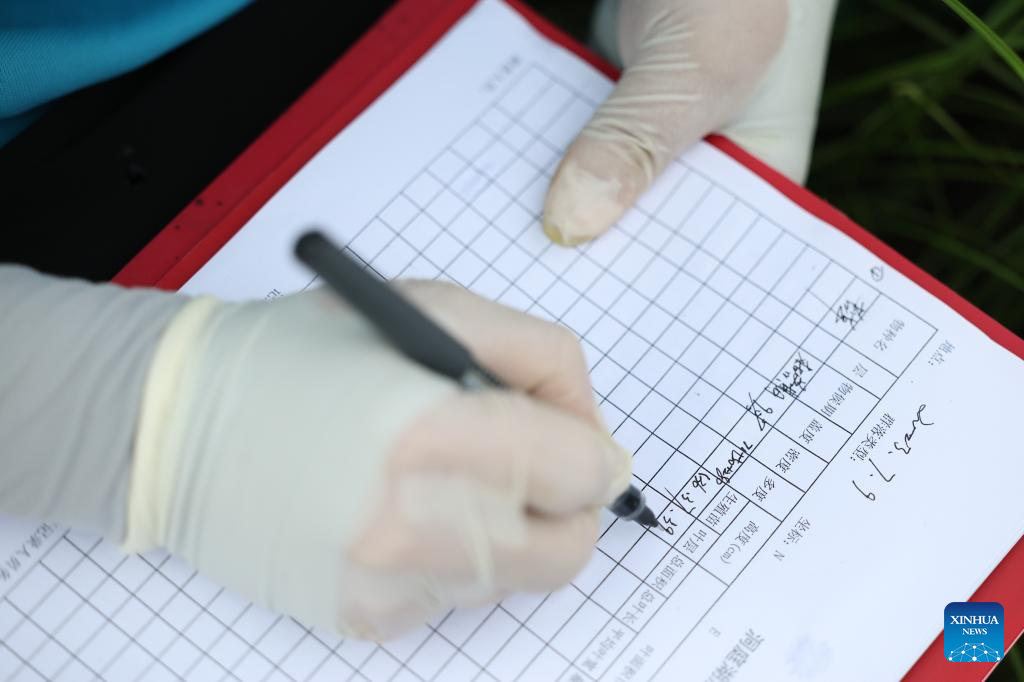
A member of the Dongting Lake Station for Wetland Ecosystem Research under the CAS records the condition of sedge samples in the east Dongting Lake nature reserve, central China's Hunan Province, July 9, 2023.
Xie Yonghong is the head of the Dongting Lake Station for Wetland Ecosystem Research under the Chinese Academy of Sciences (CAS). Researchers conduct studies on the ecosystem of the Dongting Lake wetland in this station, which was founded in 2009. Xie Yonghong has played an important role during the establishment of this station since its preparation phase in 2007.
Since 2009, Xie Yonghong and his team have taken root in the Dongting Lake wetland and committed to maintaining the local ecological balance and biodiversity for more than a decade. From the age of 36 to 50, Xie Yonghong has gradually become a scientific researcher focusing on scientific researches providing support for economic and social development and led other team members to withstand challenges and guard the Dongting Lake.
Dongting Lake, known as "the kidney of the Yangtze River," is the second-largest freshwater lake in China and one of the most important wetlands in China and the world. (Xinhua/Xue Yuge)
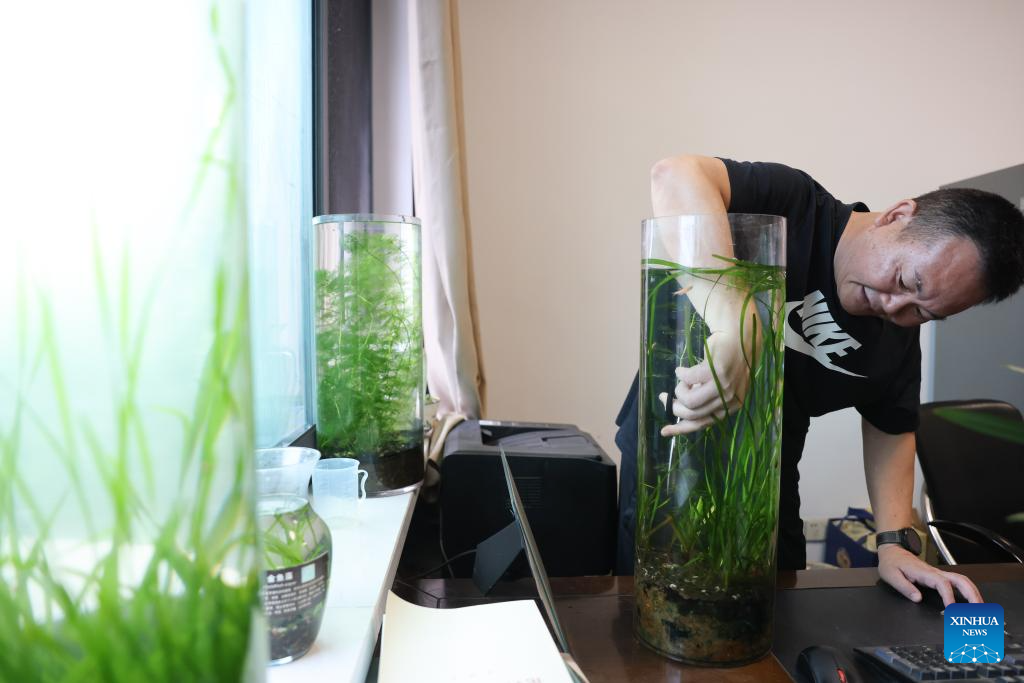
Xie Yonghong prunes submerged plants at an office of the Institute of Subtropical Agriculture of the CAS in Changsha, central China's Hunan Province, July 8, 2023.
Xie Yonghong is the head of the Dongting Lake Station for Wetland Ecosystem Research under the Chinese Academy of Sciences (CAS). Researchers conduct studies on the ecosystem of the Dongting Lake wetland in this station, which was founded in 2009. Xie Yonghong has played an important role during the establishment of this station since its preparation phase in 2007.
Since 2009, Xie Yonghong and his team have taken root in the Dongting Lake wetland and committed to maintaining the local ecological balance and biodiversity for more than a decade. From the age of 36 to 50, Xie Yonghong has gradually become a scientific researcher focusing on scientific researches providing support for economic and social development and led other team members to withstand challenges and guard the Dongting Lake.
Dongting Lake, known as "the kidney of the Yangtze River," is the second-largest freshwater lake in China and one of the most important wetlands in China and the world. (Xinhua/Jin Liwang)
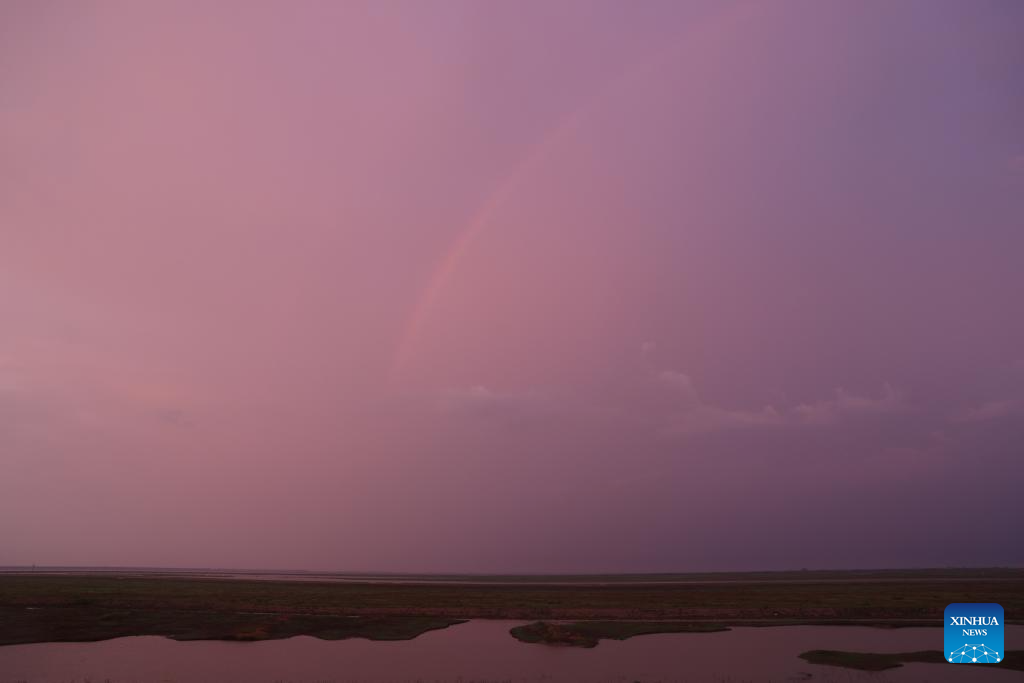
This photo taken on July 9, 2023 shows the east Dongting Lake nature reserve, central China's Hunan Province.
Xie Yonghong is the head of the Dongting Lake Station for Wetland Ecosystem Research under the Chinese Academy of Sciences (CAS). Researchers conduct studies on the ecosystem of the Dongting Lake wetland in this station, which was founded in 2009. Xie Yonghong has played an important role during the establishment of this station since its preparation phase in 2007.
Since 2009, Xie Yonghong and his team have taken root in the Dongting Lake wetland and committed to maintaining the local ecological balance and biodiversity for more than a decade. From the age of 36 to 50, Xie Yonghong has gradually become a scientific researcher focusing on scientific researches providing support for economic and social development and led other team members to withstand challenges and guard the Dongting Lake.
Dongting Lake, known as "the kidney of the Yangtze River," is the second-largest freshwater lake in China and one of the most important wetlands in China and the world. (Xinhua/Jin Liwang)
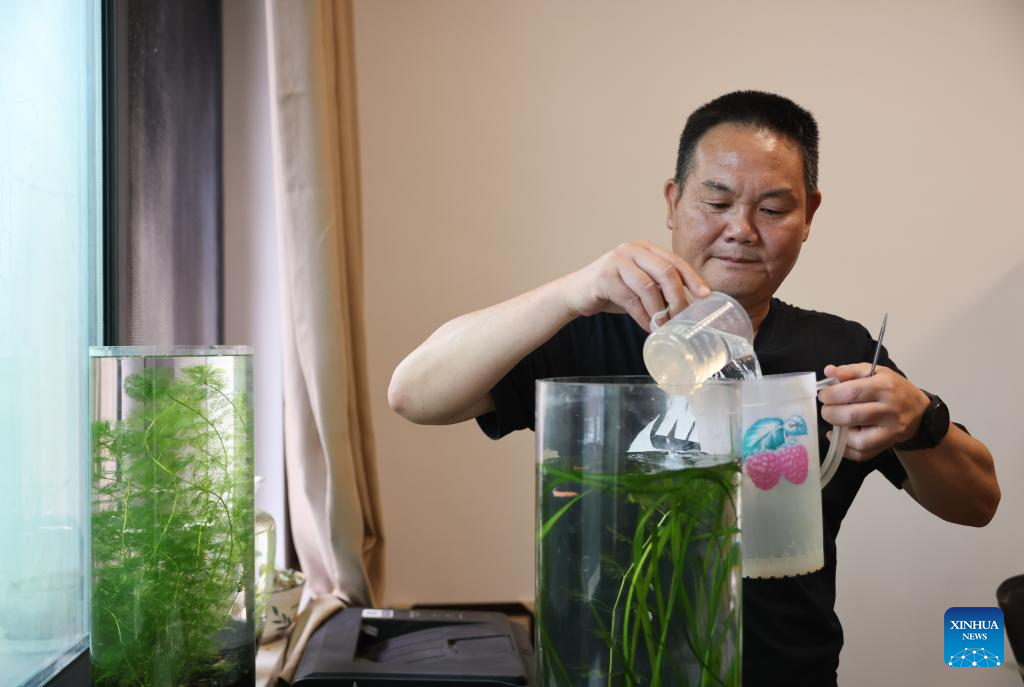
Xie Yonghong prunes submerged plants at an office of the Institute of Subtropical Agriculture of the CAS in Changsha, central China's Hunan Province, July 8, 2023.
Xie Yonghong is the head of the Dongting Lake Station for Wetland Ecosystem Research under the Chinese Academy of Sciences (CAS). Researchers conduct studies on the ecosystem of the Dongting Lake wetland in this station, which was founded in 2009. Xie Yonghong has played an important role during the establishment of this station since its preparation phase in 2007.
Since 2009, Xie Yonghong and his team have taken root in the Dongting Lake wetland and committed to maintaining the local ecological balance and biodiversity for more than a decade. From the age of 36 to 50, Xie Yonghong has gradually become a scientific researcher focusing on scientific researches providing support for economic and social development and led other team members to withstand challenges and guard the Dongting Lake.
Dongting Lake, known as "the kidney of the Yangtze River," is the second-largest freshwater lake in China and one of the most important wetlands in China and the world. (Xinhua/Jin Liwang)
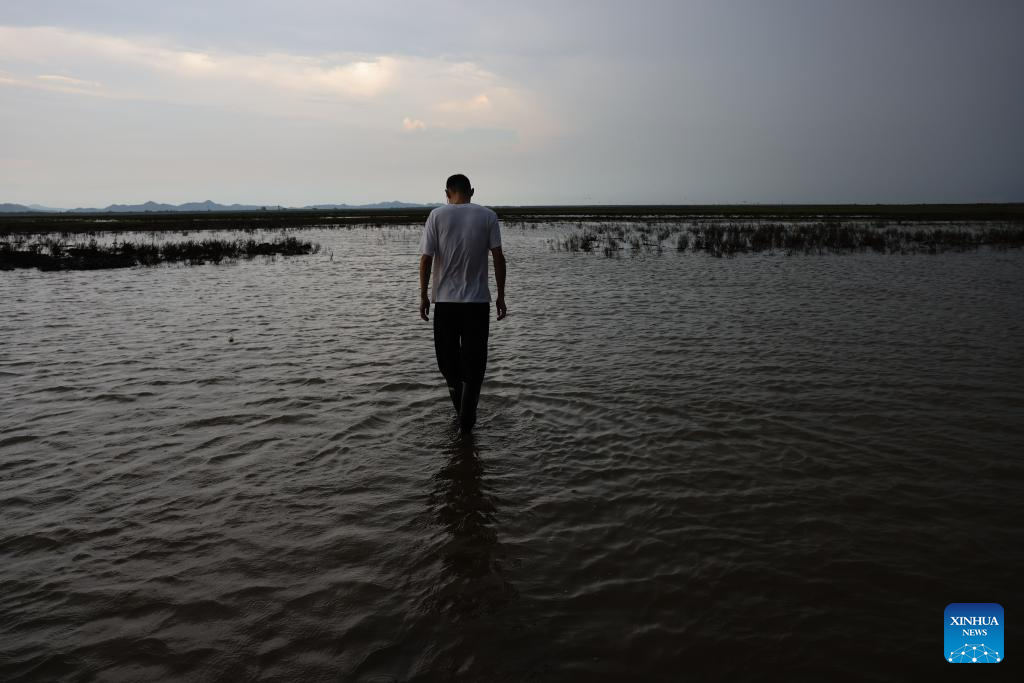
Doctor Chao Chuanxin, a member of the Dongting Lake Station for Wetland Ecosystem Research under the CAS, prepares to collect samples in the east Dongting Lake nature reserve, central China's Hunan Province, July 9, 2023.
Xie Yonghong is the head of the Dongting Lake Station for Wetland Ecosystem Research under the Chinese Academy of Sciences (CAS). Researchers conduct studies on the ecosystem of the Dongting Lake wetland in this station, which was founded in 2009. Xie Yonghong has played an important role during the establishment of this station since its preparation phase in 2007.
Since 2009, Xie Yonghong and his team have taken root in the Dongting Lake wetland and committed to maintaining the local ecological balance and biodiversity for more than a decade. From the age of 36 to 50, Xie Yonghong has gradually become a scientific researcher focusing on scientific researches providing support for economic and social development and led other team members to withstand challenges and guard the Dongting Lake.
Dongting Lake, known as "the kidney of the Yangtze River," is the second-largest freshwater lake in China and one of the most important wetlands in China and the world. (Xinhua/Jin Liwang)

Doctor Zou Yeai (L), a member of the Dongting Lake Station for Wetland Ecosystem Research under the CAS, collects sedge samples with students in the east Dongting Lake nature reserve, central China's Hunan Province, July 9, 2023.
Xie Yonghong is the head of the Dongting Lake Station for Wetland Ecosystem Research under the Chinese Academy of Sciences (CAS). Researchers conduct studies on the ecosystem of the Dongting Lake wetland in this station, which was founded in 2009. Xie Yonghong has played an important role during the establishment of this station since its preparation phase in 2007.
Since 2009, Xie Yonghong and his team have taken root in the Dongting Lake wetland and committed to maintaining the local ecological balance and biodiversity for more than a decade. From the age of 36 to 50, Xie Yonghong has gradually become a scientific researcher focusing on scientific researches providing support for economic and social development and led other team members to withstand challenges and guard the Dongting Lake.
Dongting Lake, known as "the kidney of the Yangtze River," is the second-largest freshwater lake in China and one of the most important wetlands in China and the world. (Xinhua/Xue Yuge)

Doctor Chao Chuanxin, a member of the Dongting Lake Station for Wetland Ecosystem Research under the CAS, checks the condition of submerged plants in the east Dongting Lake nature reserve, central China's Hunan Province, July 9, 2023.
Xie Yonghong is the head of the Dongting Lake Station for Wetland Ecosystem Research under the Chinese Academy of Sciences (CAS). Researchers conduct studies on the ecosystem of the Dongting Lake wetland in this station, which was founded in 2009. Xie Yonghong has played an important role during the establishment of this station since its preparation phase in 2007.
Since 2009, Xie Yonghong and his team have taken root in the Dongting Lake wetland and committed to maintaining the local ecological balance and biodiversity for more than a decade. From the age of 36 to 50, Xie Yonghong has gradually become a scientific researcher focusing on scientific researches providing support for economic and social development and led other team members to withstand challenges and guard the Dongting Lake.
Dongting Lake, known as "the kidney of the Yangtze River," is the second-largest freshwater lake in China and one of the most important wetlands in China and the world. (Xinhua/Zhou Dixiao)
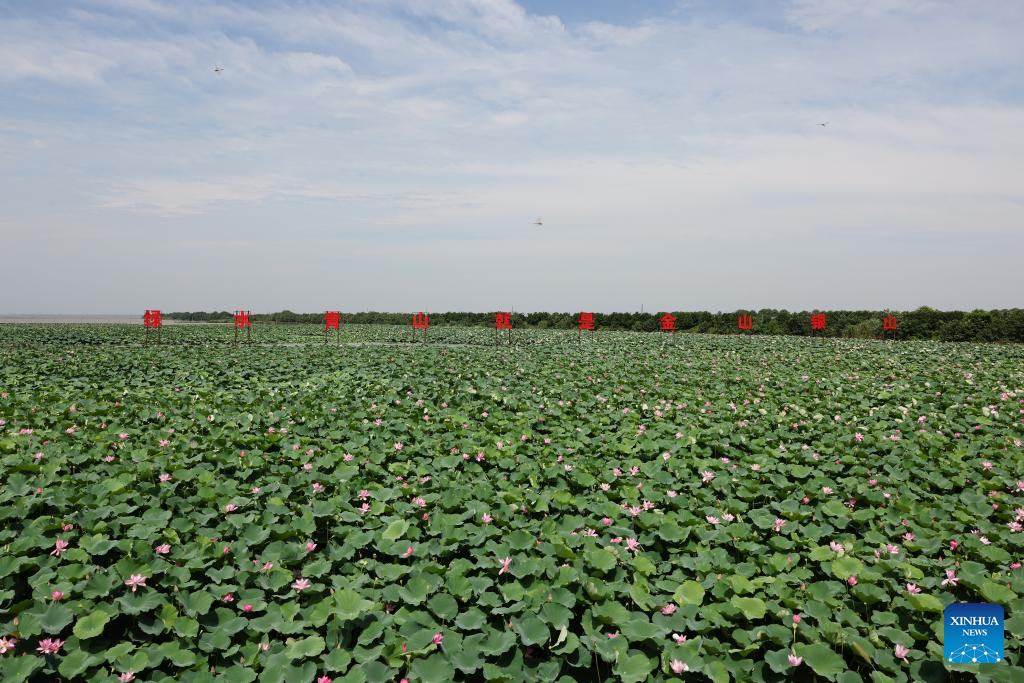
This photo taken on July 10, 2023 shows lotus of the Datong Lake in Yiyang, central China's Hunan Province. Located on the central region of the Dongting Lake, Datong Lake is known as "the heart of the Dongting Lake".
Xie Yonghong is the head of the Dongting Lake Station for Wetland Ecosystem Research under the Chinese Academy of Sciences (CAS). Researchers conduct studies on the ecosystem of the Dongting Lake wetland in this station, which was founded in 2009. Xie Yonghong has played an important role during the establishment of this station since its preparation phase in 2007.
Since 2009, Xie Yonghong and his team have taken root in the Dongting Lake wetland and committed to maintaining the local ecological balance and biodiversity for more than a decade. From the age of 36 to 50, Xie Yonghong has gradually become a scientific researcher focusing on scientific researches providing support for economic and social development and led other team members to withstand challenges and guard the Dongting Lake.
Dongting Lake, known as "the kidney of the Yangtze River," is the second-largest freshwater lake in China and one of the most important wetlands in China and the world. (Xinhua/Jin Liwang)

This aerial photo taken on July 10, 2023 shows the Datong Lake aquatic plants industrial demonstration park in Datong Lake District of Yiyang, central China's Hunan Province. Located on the central region of the Dongting Lake, Datong Lake is known as "the heart of the Dongting Lake".
Xie Yonghong is the head of the Dongting Lake Station for Wetland Ecosystem Research under the Chinese Academy of Sciences (CAS). Researchers conduct studies on the ecosystem of the Dongting Lake wetland in this station, which was founded in 2009. Xie Yonghong has played an important role during the establishment of this station since its preparation phase in 2007.
Since 2009, Xie Yonghong and his team have taken root in the Dongting Lake wetland and committed to maintaining the local ecological balance and biodiversity for more than a decade. From the age of 36 to 50, Xie Yonghong has gradually become a scientific researcher focusing on scientific researches providing support for economic and social development and led other team members to withstand challenges and guard the Dongting Lake.
Dongting Lake, known as "the kidney of the Yangtze River," is the second-largest freshwater lake in China and one of the most important wetlands in China and the world. (Xinhua/Xue Yuge)
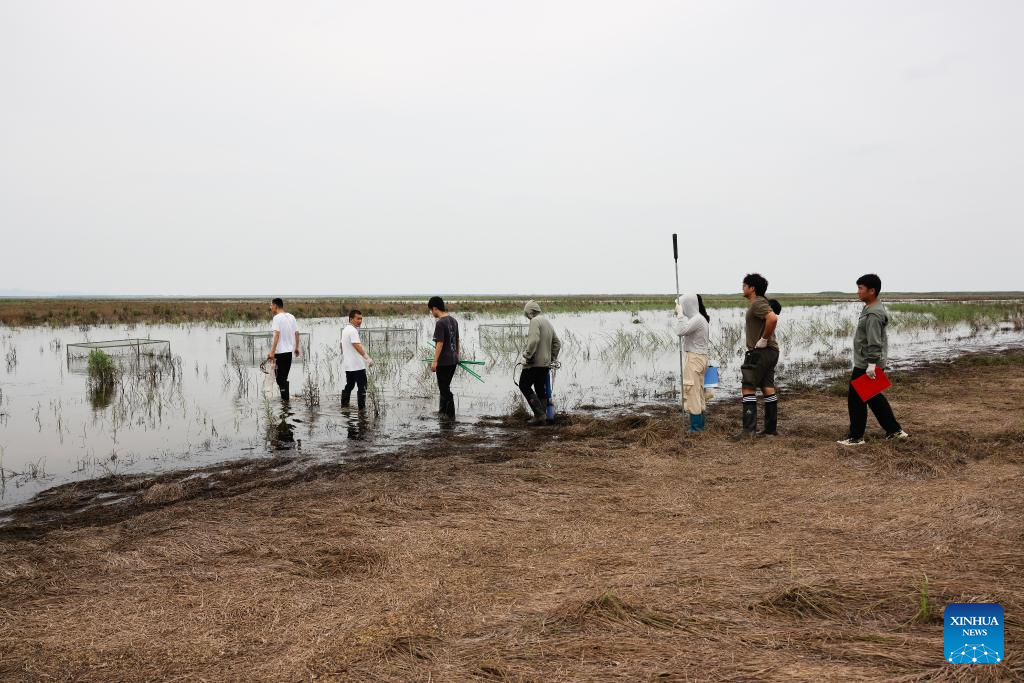
Members of the Dongting Lake Station for Wetland Ecosystem Research under the CAS collect samples in the east Dongting Lake nature reserve, central China's Hunan Province, July 9, 2023.
Xie Yonghong is the head of the Dongting Lake Station for Wetland Ecosystem Research under the Chinese Academy of Sciences (CAS). Researchers conduct studies on the ecosystem of the Dongting Lake wetland in this station, which was founded in 2009. Xie Yonghong has played an important role during the establishment of this station since its preparation phase in 2007.
Since 2009, Xie Yonghong and his team have taken root in the Dongting Lake wetland and committed to maintaining the local ecological balance and biodiversity for more than a decade. From the age of 36 to 50, Xie Yonghong has gradually become a scientific researcher focusing on scientific researches providing support for economic and social development and led other team members to withstand challenges and guard the Dongting Lake.
Dongting Lake, known as "the kidney of the Yangtze River," is the second-largest freshwater lake in China and one of the most important wetlands in China and the world. (Xinhua/Jin Liwang)
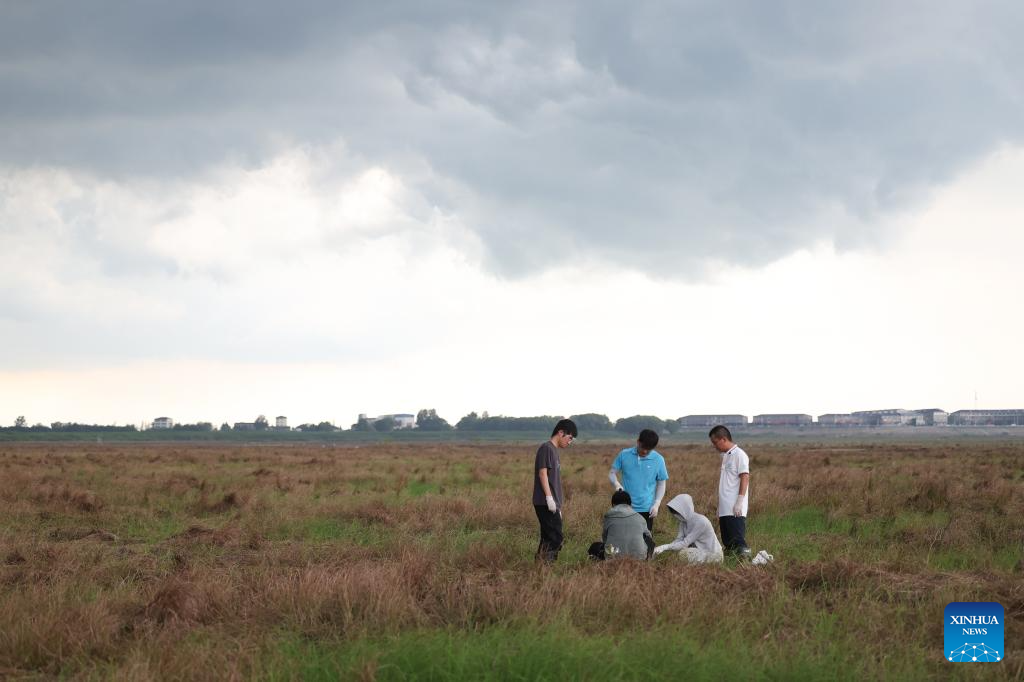
Doctor Zou Yeai (1st, R), a member of the Dongting Lake Station for Wetland Ecosystem Research under the CAS, collects samples with students in the east Dongting Lake nature reserve, central China's Hunan Province, July 9, 2023.
Xie Yonghong is the head of the Dongting Lake Station for Wetland Ecosystem Research under the Chinese Academy of Sciences (CAS). Researchers conduct studies on the ecosystem of the Dongting Lake wetland in this station, which was founded in 2009. Xie Yonghong has played an important role during the establishment of this station since its preparation phase in 2007.
Since 2009, Xie Yonghong and his team have taken root in the Dongting Lake wetland and committed to maintaining the local ecological balance and biodiversity for more than a decade. From the age of 36 to 50, Xie Yonghong has gradually become a scientific researcher focusing on scientific researches providing support for economic and social development and led other team members to withstand challenges and guard the Dongting Lake.
Dongting Lake, known as "the kidney of the Yangtze River," is the second-largest freshwater lake in China and one of the most important wetlands in China and the world. (Xinhua/Xue Yuge)
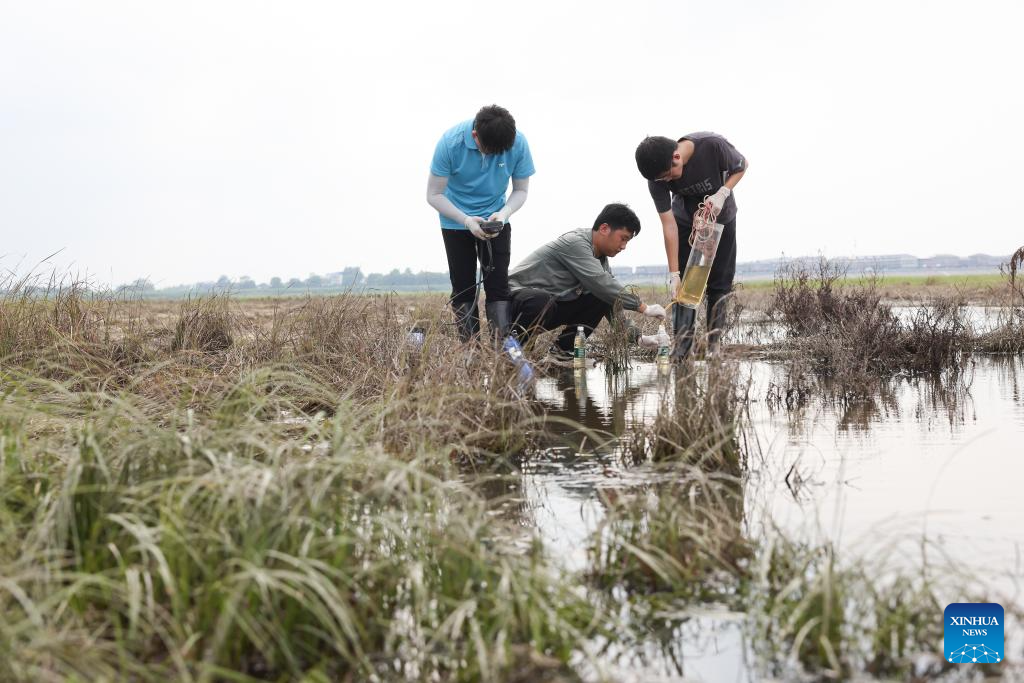
Members of the Dongting Lake Station for Wetland Ecosystem Research under the CAS collect water samples and test water quality in the east Dongting Lake nature reserve, central China's Hunan Province, July 9, 2023.
Xie Yonghong is the head of the Dongting Lake Station for Wetland Ecosystem Research under the Chinese Academy of Sciences (CAS). Researchers conduct studies on the ecosystem of the Dongting Lake wetland in this station, which was founded in 2009. Xie Yonghong has played an important role during the establishment of this station since its preparation phase in 2007.
Since 2009, Xie Yonghong and his team have taken root in the Dongting Lake wetland and committed to maintaining the local ecological balance and biodiversity for more than a decade. From the age of 36 to 50, Xie Yonghong has gradually become a scientific researcher focusing on scientific researches providing support for economic and social development and led other team members to withstand challenges and guard the Dongting Lake.
Dongting Lake, known as "the kidney of the Yangtze River," is the second-largest freshwater lake in China and one of the most important wetlands in China and the world. (Xinhua/Jin Liwang)
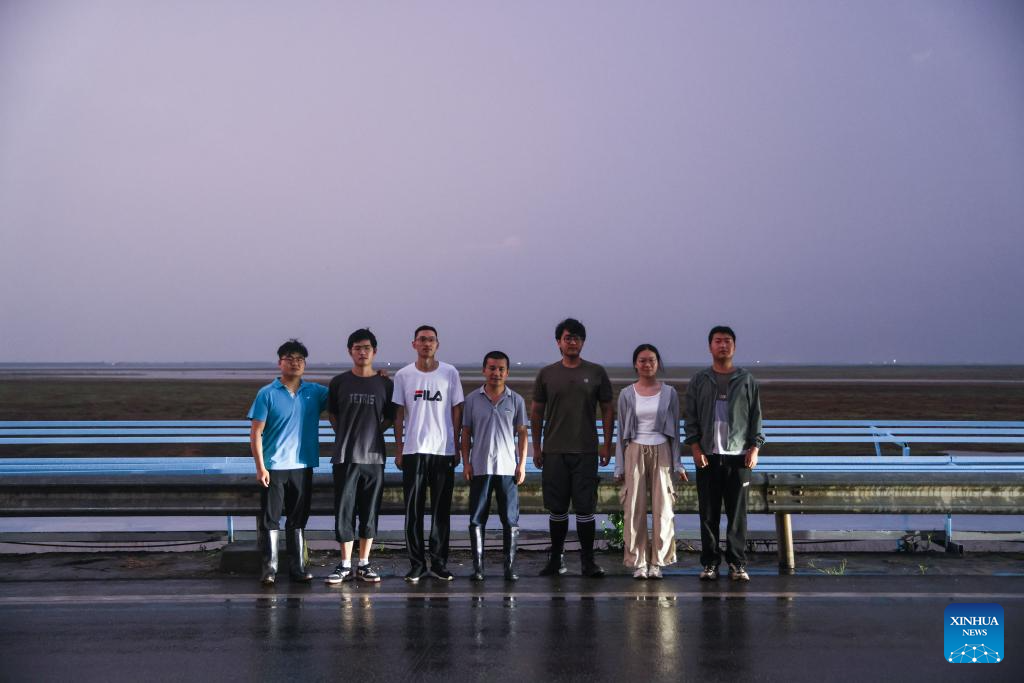
Members of the Dongting Lake Station for Wetland Ecosystem Research under the CAS pose for a photo after collecting samples in the east Dongting Lake nature reserve, central China's Hunan Province, July 9, 2023.
Xie Yonghong is the head of the Dongting Lake Station for Wetland Ecosystem Research under the Chinese Academy of Sciences (CAS). Researchers conduct studies on the ecosystem of the Dongting Lake wetland in this station, which was founded in 2009. Xie Yonghong has played an important role during the establishment of this station since its preparation phase in 2007.
Since 2009, Xie Yonghong and his team have taken root in the Dongting Lake wetland and committed to maintaining the local ecological balance and biodiversity for more than a decade. From the age of 36 to 50, Xie Yonghong has gradually become a scientific researcher focusing on scientific researches providing support for economic and social development and led other team members to withstand challenges and guard the Dongting Lake.
Dongting Lake, known as "the kidney of the Yangtze River," is the second-largest freshwater lake in China and one of the most important wetlands in China and the world. (Xinhua/Jin Liwang)
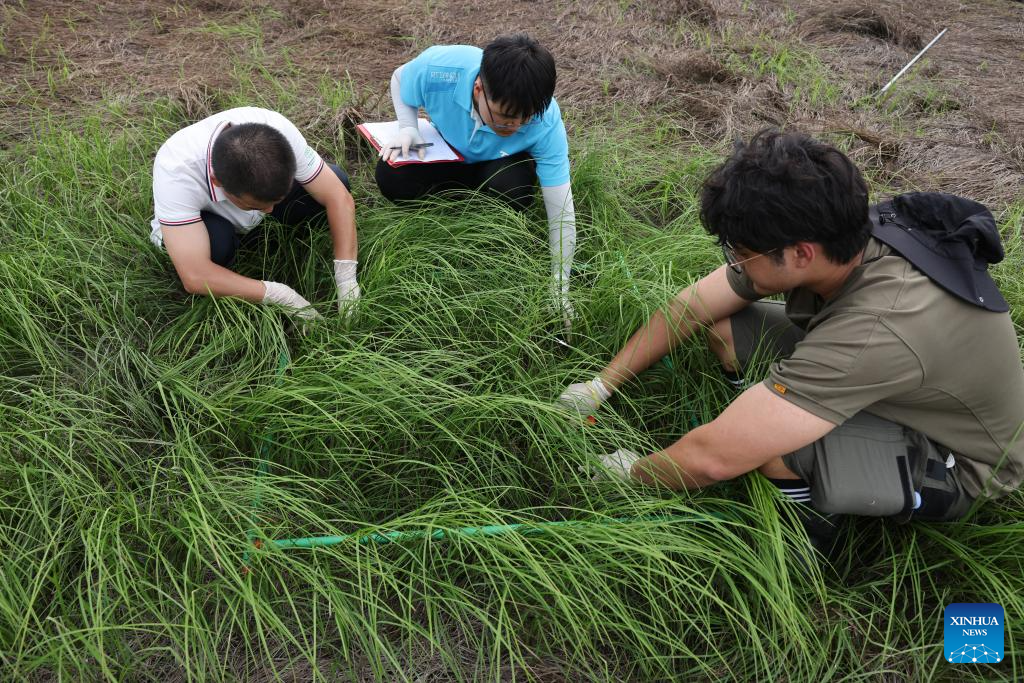
Doctor Zou Yeai (L), a member of the Dongting Lake Station for Wetland Ecosystem Research under the CAS, collects sedge samples with students in the east Dongting Lake nature reserve, central China's Hunan Province, July 9, 2023.
Xie Yonghong is the head of the Dongting Lake Station for Wetland Ecosystem Research under the Chinese Academy of Sciences (CAS). Researchers conduct studies on the ecosystem of the Dongting Lake wetland in this station, which was founded in 2009. Xie Yonghong has played an important role during the establishment of this station since its preparation phase in 2007.
Since 2009, Xie Yonghong and his team have taken root in the Dongting Lake wetland and committed to maintaining the local ecological balance and biodiversity for more than a decade. From the age of 36 to 50, Xie Yonghong has gradually become a scientific researcher focusing on scientific researches providing support for economic and social development and led other team members to withstand challenges and guard the Dongting Lake.
Dongting Lake, known as "the kidney of the Yangtze River," is the second-largest freshwater lake in China and one of the most important wetlands in China and the world. (Xinhua/Jin Liwang)
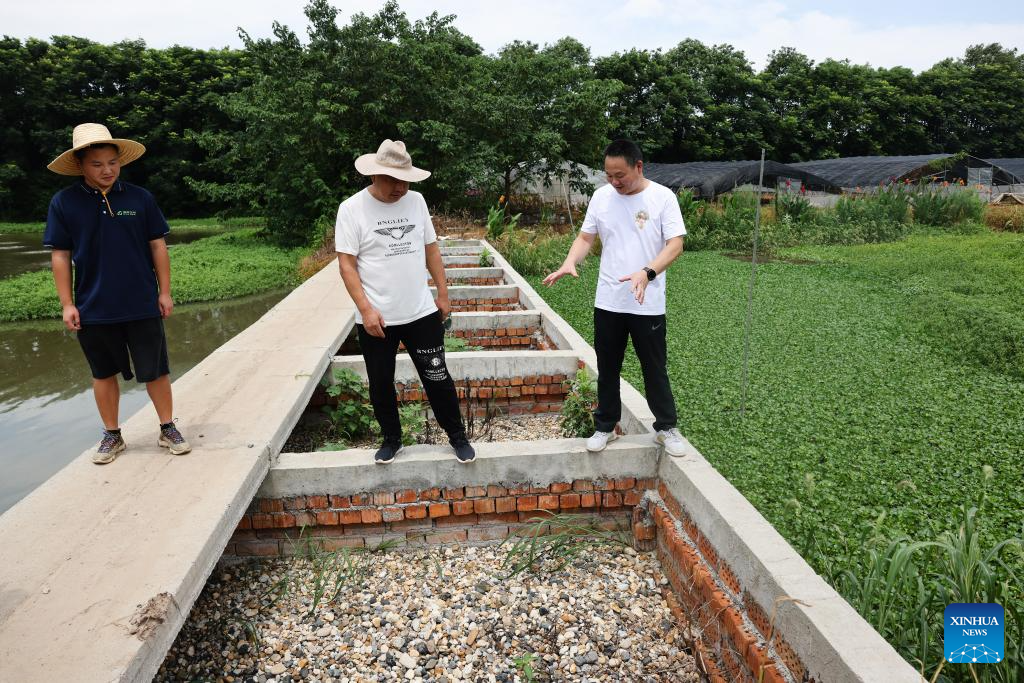
Xie Yonghong (R) introduces a self-designed breeding tailwater treatment facility at a bullfrog breeding base in Heba Town, Datong Lake District of Yiyang, central China's Hunan Province, July 10, 2023. Located on the central region of the Dongting Lake, Datong Lake is known as "the heart of the Dongting Lake".
Xie Yonghong is the head of the Dongting Lake Station for Wetland Ecosystem Research under the Chinese Academy of Sciences (CAS). Researchers conduct studies on the ecosystem of the Dongting Lake wetland in this station, which was founded in 2009. Xie Yonghong has played an important role during the establishment of this station since its preparation phase in 2007.
Since 2009, Xie Yonghong and his team have taken root in the Dongting Lake wetland and committed to maintaining the local ecological balance and biodiversity for more than a decade. From the age of 36 to 50, Xie Yonghong has gradually become a scientific researcher focusing on scientific researches providing support for economic and social development and led other team members to withstand challenges and guard the Dongting Lake.
Dongting Lake, known as "the kidney of the Yangtze River," is the second-largest freshwater lake in China and one of the most important wetlands in China and the world. (Xinhua/Jin Liwang)
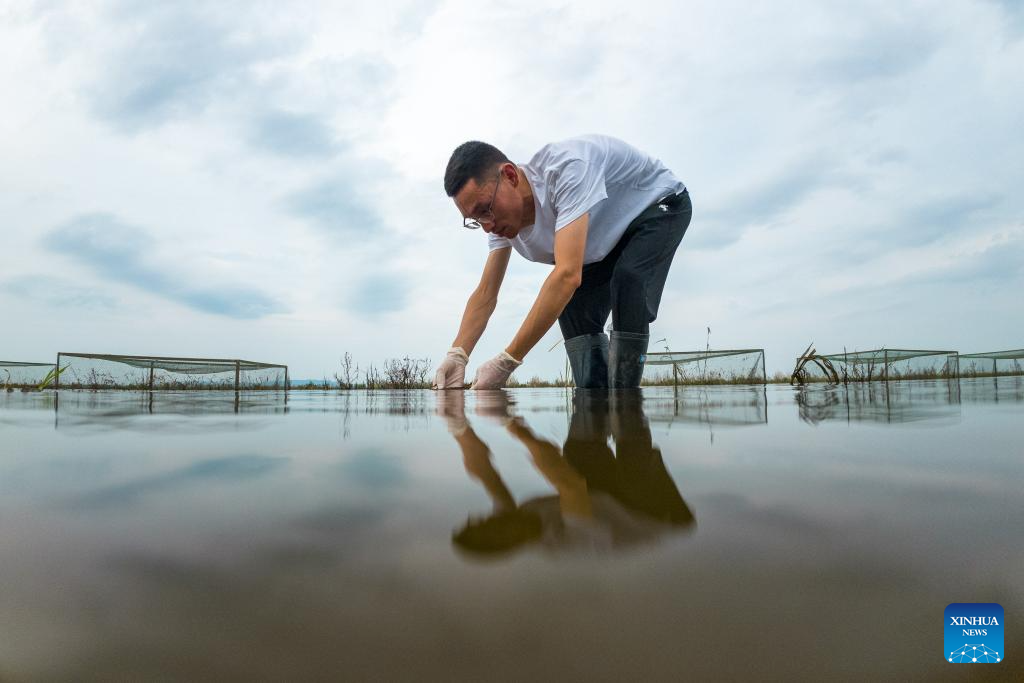
Doctor Chao Chuanxin, a member of the Dongting Lake Station for Wetland Ecosystem Research under the CAS, checks the condition of submerged plants in the east Dongting Lake nature reserve, central China's Hunan Province, July 9, 2023.
Xie Yonghong is the head of the Dongting Lake Station for Wetland Ecosystem Research under the Chinese Academy of Sciences (CAS). Researchers conduct studies on the ecosystem of the Dongting Lake wetland in this station, which was founded in 2009. Xie Yonghong has played an important role during the establishment of this station since its preparation phase in 2007.
Since 2009, Xie Yonghong and his team have taken root in the Dongting Lake wetland and committed to maintaining the local ecological balance and biodiversity for more than a decade. From the age of 36 to 50, Xie Yonghong has gradually become a scientific researcher focusing on scientific researches providing support for economic and social development and led other team members to withstand challenges and guard the Dongting Lake.
Dongting Lake, known as "the kidney of the Yangtze River," is the second-largest freshwater lake in China and one of the most important wetlands in China and the world. (Xinhua/Zhou Dixiao)
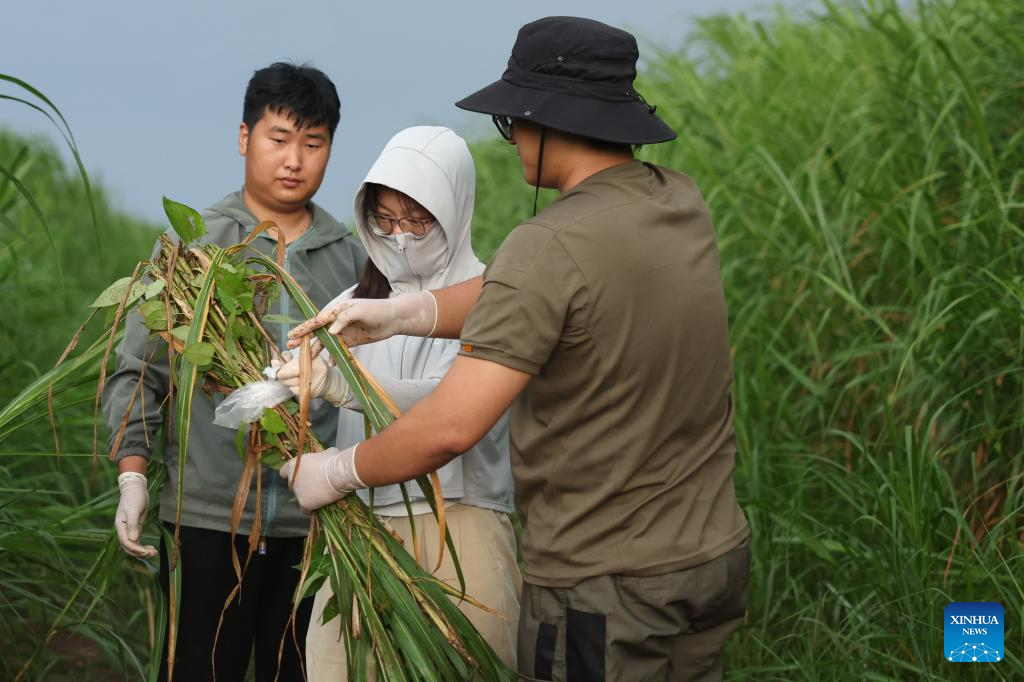
Members of the Dongting Lake Station for Wetland Ecosystem Research under the CAS prepare plant samples in the east Dongting Lake nature reserve, central China's Hunan Province, July 9, 2023.
Xie Yonghong is the head of the Dongting Lake Station for Wetland Ecosystem Research under the Chinese Academy of Sciences (CAS). Researchers conduct studies on the ecosystem of the Dongting Lake wetland in this station, which was founded in 2009. Xie Yonghong has played an important role during the establishment of this station since its preparation phase in 2007.
Since 2009, Xie Yonghong and his team have taken root in the Dongting Lake wetland and committed to maintaining the local ecological balance and biodiversity for more than a decade. From the age of 36 to 50, Xie Yonghong has gradually become a scientific researcher focusing on scientific researches providing support for economic and social development and led other team members to withstand challenges and guard the Dongting Lake.
Dongting Lake, known as "the kidney of the Yangtze River," is the second-largest freshwater lake in China and one of the most important wetlands in China and the world. (Xinhua/Xue Yuge)
来源:Xinhua
编辑:谭婕倪